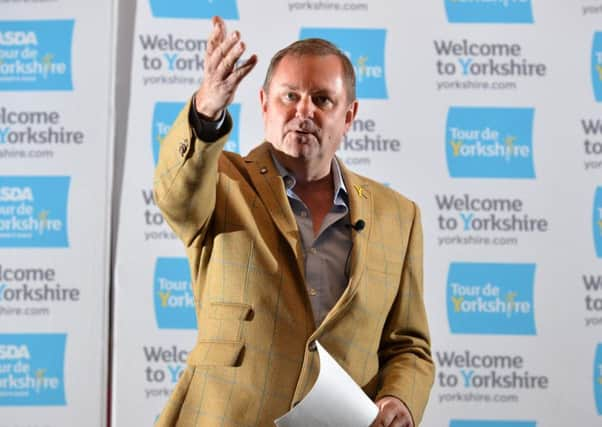David Behrens: Dramatic downfall of Sir Gary Verity puts achievements in new light


The accounts elsewhere in this newspaper of a man who wore out personal assistants faster than other people get through sticks of gum, puts the acquisition of the Tour de France and the cycle races that followed, in a questionable new light.
It’s sad on so many levels. I can think of very few individuals who have made such a singular contribution to the business or cultural life of the region. Sir Ken Morrison created a retail empire, Bob Slicer built a roadside recovery operation to rival the AA, and Jonathan Silver saved the mill that is the centrepiece of what became a World Heritage Site at Saltaire.
Advertisement
Hide AdAdvertisement
Hide AdIf they had anything in common, other than the individuality that set them apart, it was their single-mindedness. I encountered them all and I don’t think I’d have enjoyed working for any of them, charming though they were.
Sir Gary was also someone who dispensed charm by the bucketful, although we now learn that he did so only selectively.
His faults do not cancel out his achievements, however, and the two warrant being weighed separately.
On his 10-year watch as boss of an agency that had existed for decades under various names but whose profile seldom rose above the median, Yorkshire was placed on a world stage. Its wonderful landscape was exposed to the gaze of the airborne cameras that covered the cycle races as they threaded through its country roads; its name was planted in the subconscious of everyone arranging a holiday.
Advertisement
Hide AdAdvertisement
Hide AdThat was not the outcome of a public body working to a traditional template but of someone obstinately pushing against the grain. You can’t make an omelette without breaking eggs but the default position of too many public officials is to not even try, in case the pan gets too hot and becomes a health and safety issue.
The culture of modern office politics mitigates against mavericks and towards “team players”. Those choosing to plough their own furrow navigate a dangerous line between assertiveness and bullying.
It had been the Government’s intention that when the Grand Depart of the Tour de France came to Britain five years ago, it would be Scotland, not Yorkshire, that would host it, and the unseating of that plan broke a few too many eggs for some people’s liking.
This was evident when Sir Gary’s name was omitted from the following New Year’s Honours List, and David Cameron forced to deny that his Government had failed to get behind Yorkshire’s initiative.
Advertisement
Hide AdAdvertisement
Hide AdThe benefit to our economy of the big race was said to be £100m, though the real figure is hard to quantify. However, the public sum that went on securing it should be easily accounted for, and the circumstances of Sir Gary’s departure – with his expenses as well as his behaviour under scrutiny – mean that there will be pressure on Welcome to Yorkshire to publish the details.
There is a lot at stake here; certainly more than the reputation of one man. Tourism, we are told, is now worth £8bn to the Yorkshire economy, and while you can argue about the figures, there is no doubt that it is a lifeline to a great many small businesses. In rural parts, it is second only to agriculture in its importance. We owe it to those for whom the money makes the difference between working and not, to keep up the momentum.
Who will do this? Welcome to Yorkshire’s former head of communications, an old friend, said last weekend that its success was never about one individual. It was due, she said, to a dedicated team who worked there often beyond the call of duty.
The challenge facing those who remain is to prove the organisation is not just a one-trick pony; that it can deliver big ticket events without Sir Gary at the helm, and within a rigid and open financial framework. That’s a big ask for his successor.
Advertisement
Hide AdAdvertisement
Hide AdBy coincidence, Wednesday sees Welcome to Yorkshire’s annual presentation to its members, a showbizzy gathering under whose spotlight he would have been the star. The curtain will now have to go up without him, but what sort of second act will it be?